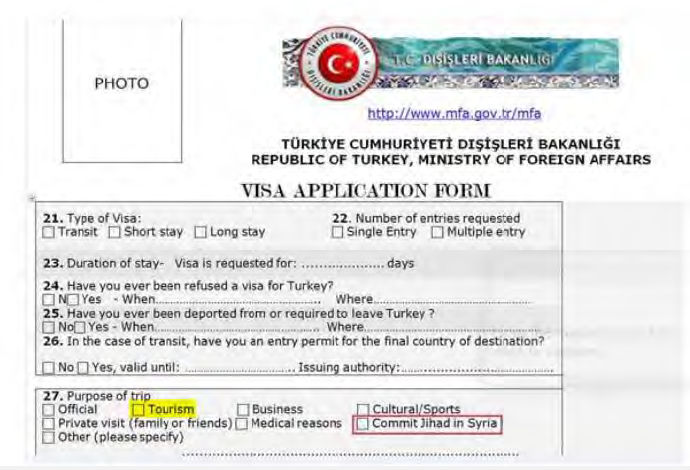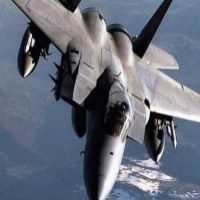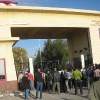![]()
This report was originally published on March 23, 2015 by the Meir Amit Intelligence and Terrorism Information Center. To learn more about ISIS, please read “ISIS: Portrait of a Jihadi Terrorist Organization“.
Overview

The cover of a manual containing updated security recommendations for operatives joining the Islamic State.
In February 2015, ISIS published a fifty-page manual distributed online, entitled “Hijrah to the Islamic State, 2015”.[1] The English-language manual serves as a guide for foreign fighters from Western countries who want to join the ranks of ISIS. The manual includes many tips and operational recommendations about the preferred ways to travel from European countries to Turkey, and from there to Syria (including detailed maps of the border crossings between Syria and Turkey).
The recommendations deal with behavior vis-à-vis the Turkish authorities at airports and border crossings and delve into detail (such as what to pack and bring). In the ITIC’s assessment, these recommendations were issued in light of the recently increased security and preventive measures on the part of Western European countries and Turkey.
The cover of the manual states that it was issued in 2015 by the Islamic State. There are no other details that could indicate who was responsible for its publication. It was distributed by ISIS-affiliated entities on file sharing websites and social networks. Authorities in the US and European countries acted to remove links to the manual from the websites that distribute it, and Britain’s Counter-Terrorism Internet Referral Unit (CTIRU) designated the manual as a terrorist publication (Guardian, February 25, 2015). However, in the ITIC’s assessment, the tips in the manual have been internalized by jihadi networks and operatives, who make practical use of them when they depart for Turkey.[2]

An example of the recommendations in the manual: operatives are advised to pose as tourists and refrain from declaring that the purpose of their trip is to “Commit Jihad in Syria”.
The manual places great emphasis on Turkey, which serves as the main conduit for ISIS operatives and operatives of other global jihad organizations who make their way to Syria. Until early 2015, operatives passed through Turkey with relative ease, since the Turkish authorities turned a blind eye, partly because they wanted to avoid a confrontation with ISIS. However, Turkey has recently begun to make it harder for operatives to enter its territory, and this is emphasized in the manual. The manual states that there is currently no cooperation between ISIS and the Turkish authorities and that the Turkish intelligence services attempt to imprison anyone suspected of membership in ISIS. However, the manual states that ISIS operatives continue to “live in Turkey in some peace” due to Turkey’s fear of “revenge attacks” on the part of ISIS (page 6 of the manual, see the English text below).
Despite increasing security and preventive measures on the part of Turkey and European countries, the flow of those joining the ranks of ISIS continues, although it may have lessened somewhat in some countries. In the ITIC’s assessment, there are a number of explanations for this:
- ISIS’s great ideological attraction, motivating young people from the Arab World and the West to join the Islamic State, still exists (and may even have increased in view of the international campaign being waged against ISIS). The security measures are causing jihadi operatives to increase their counter-measures and caution, but do not affect their motivation to join the ranks of ISIS.
- The lack of an adequate response from the West: European countries have not yet employed effective security measures to deal with the phenomenon of foreign fighters. This is due to political, legal and social difficulties in the various countries. This was reflected in a statement by the International Coalition Coordinator John Allen, who noted that the members of the coalition had recently begun to prepare for the more coordinated and planned actions that are necessary in order to address the threat of the foreign fighters. However, John Allen admitted that despite the restrictions imposed on them, foreign fighters continue to join the ranks of ISIS and therefore tighter international cooperation should be promoted (US Department of State website, March 2, 2015).
- The Turkish measures are still not effective enough: Turkey, which is a “key transit country” for foreign fighters, is trying to deal with the problem in a variety of ways. But it, too, is avoiding a comprehensive campaign against the jihadi infrastructure in its territory. This is due to both political considerations and the fear of revenge attacks against it (as stated in the manual). Furthermore, its ability to effectively close the border with Syria is apparently limited. The ITIC’s impression is that the Turkish preventive measures are more effective at airports and in the city of Istanbul, which most of the foreign fighters pass through, and less effective along the long and open border between Turkey and Syria.
- ISIS’s preventive measures: ISIS employs a variety of preventive measures to circumvent the security measures being taken against it (as is reflected in the manual issued in February 2015). The continued flow of foreign fighters to Turkey and from there to Syria may indicate that up to now, ISIS and jihadi operatives have been able to address the security measures being taken against them.
The main recommendations appearing in the manual
The manual is intended for European foreign fighters traveling to Syria to join the ranks of ISIS. Many of the recommendations in the manual deal with Turkey, which is a main route for the operatives (the manual does not deal with entering Syria via other countries — Lebanon, Jordan or Iraq). The manual comprises several chapters of recommendations on how to travel to Turkey and cross the border into Syria, and how to outwit the local authorities.
Here are some examples:
- Departure for Turkey: the manual’s recommendation is not to travel directly from one’s home country to Turkey, since direct flights are liable to arouse suspicion. Therefore, the manual recommends travelling to another country in Europe (Greece and Spain are mentioned) and buying a plane ticket from there to Turkey. The manual also recommends purchasing round-trip plane tickets (even though the foreign fighters do not intend to return to their countries of origin) so as not to arouse suspicion.
- Arrival in Turkey: the manual provides details about the questioning and checks undergone by foreign fighters who arrive in Turkey and includes recommendations on how to answer the Turkish officials. The main tip for those who come to Turkey is to pose as tourists and display familiarity with the tourist sites in Turkey, in order to lend credence to their cover story.
- Contacting operatives who help ISIS: on arrival in Turkey, the foreign fighters are advised to get in touch with a local contact, usually through Twitter (the manual provides a Twitter address and a number of alternative addresses in case one of the addresses is shut down). The manual also mentions safe houses in Turkey where the foreign fighters stay until they are taken to Syria.
- Necessary equipment: the manual includes a chapter with recommendations about the necessary equipment for Syria and how to pack it. Those leaving for Syria are advised to bring just three items with them: a bag, a backpack, and a suitcase. In the ITIC’s assessment, this is in order not to attract unnecessary attention, and to make crossing the border as easy as possible.
- Women: the manual includes a chapter devoted to special recommendations for women travelling to Syria. These recommendations include warnings not to use public transportation, not to move in large groups (more than three), to bring a mobile phone and to learn a few basic sentences in Turkish (Note: women also join the ranks of ISIS, some on an individual basis and others to join their husbands).
Appendix
Turkey as a central transit country for jihadi operatives
Turkey serves as the main conduit for ISIS operatives and operatives of other global jihad organizations making their way from their countries of origin to Syria. Most of the foreign fighters come to Syria via Turkey, which has a long and open border with Syria, approximately 900 km in length. Getting to Turkey from European countries is convenient and inexpensive. Most of the foreign fighters travel to Turkey by air, on commercial flights. Turkey can also be reached by land transport, without the need for a passport or visa (it is sufficient for the foreign fighter to possess an ID card).
There is an extensive jihadi infrastructure in Turkey which receives the European and Arab/Muslims foreign fighters and sends them to Syria. The jihadi infrastructure accommodates the foreign fighters in safe houses, smuggles them into Syria and ensures that they meet up with ISIS operatives. In January 2015, the Turkish newspaper Hürriyet cited a police intelligence report stating that there were at least 3,000 people in Turkey who are affiliated with ISIS in one way or another and should be monitored.
Until late 2014, it was relatively easy for the foreign fighters to pass through Turkey, since the Turkish authorities turned a blind eye. However, as the flow of foreign fighters passing through Turkey on their way to Syria increased, concerns about the return of the foreign fighters from Syria and Iraq to their home countries also increased. Western countries began to criticize Turkey and to demand that it employ effective measures against this phenomenon. The Turkish government was accused of not doing enough to prevent the flow of foreign fighters who come to Syria from Turkish territory and that it is not acting to close the border with Syria.
Since the beginning of 2015, the media reported that Turkey had started to take steps against the passage of jihadi operatives via the country. The Turkish authorities reported that in January 2015, they deported 1,165 people suspected of belonging to ISIS and refused entry to 7,250 people. The Turkish government apparently believed that such steps come with a price: Turkish police have warned of possible acts of revenge by ISIS networks throughout Turkey, chiefly attacks on embassies and consulates of Western countries (Hürriyet, January 17, 2015).[3]
In February 2015, Turkey increased security measures designed to prevent jihadi operatives from arriving in Turkey and crossing the border into Syria. The Turks presented journalists with the “risk centers” which they have set up at international airports, border crossings and central bus stations. These “risk centers” are supposed to monitor suspicious operatives and return them to their home countries. In February 2015, the Turkish authorities reported that they have monitored 1,500 suspects to date, and that approximately one third of them were sent back to their home countries (Hürriyet, February 1, 2015). In addition, Turkish security forces carried out raids and arrested suspects, increased the supervision at its border crossings, improved the intelligence surveillance of those entering Turkey, and carried out security activity at the Syrian refugee camps and in cities near the border with Syria and Iraq.
In view of these measures, Turkish Minister of Foreign Affairs Mevlüt Çavuşoğlu said that Turkey was being unjustly accused, since it was making every effort to close its borders. He also called on European countries to share more information about those who enlist in the ranks of radical jihadi organizations (Hürriyet, March 13, 2015).
Results of the Turkish security measures
These security measures recently led to the arrest and deportation of jihadi operatives who came to Turkey on their way to Syria. According to Turkish and Western media reports, these arrests were made in Istanbul as well as near the Syrian border. The ITIC’s impression is that the Turkish measures are more effective at airports and less so in southern Turkey, near the long and open border with Syria. Possible evidence of this can be found in a report by a New York Times reporter who accompanied Turkish smugglers near Gaziantep, a city in southern Turkey, near the border with Syria. According to the reporter, although Turkey is taking preventative measures, the flow of operatives crossing from Turkey to Syria continues. Smugglers living in the area, who make a living from smuggling cigarettes and other goods, claim that ISIS operatives are forcing them under threat to smuggle the foreign fighters (Zaman, March 11, 2015).
The Turkish measures have apparently had some effect on ISIS’s freedom of action and visibility in Turkey. In the past, it was reported that ISIS contacts, who operated virtually unimpededly, would wait for the foreign fighters who arrived in Turkey. They also published details about safe houses for use by the operatives. It is evident from the manual that from ISIS’s perspective, there is currently no cooperation between ISIS operatives and the Turkish authorities, and that the Turkish intelligence services attempt to imprison anyone suspected of membership in ISIS. However, it is also evident from the manual that ISIS’s support infrastructure in Turkey continues to exist mainly due to the Turkish authorities’ fear of acts of revenge. Following is a relevant passage from the manual on ISIS’s relations with Turkey (page 6):
“Note: it is important to know that the Turkish intelligence agencies are in no way friends of the Islamic State, they will try to imprison anyone they suspect of being members of the Islamic State. The only reason members live in Turkey in some peace is because Turkey fears revenge attacks.”
However, judging by the results, despite the security measures against ISIS, the flow of operatives travelling to Syria via Turkey and returning by the same route has not ceased. European media outlets continue to publish reports about operatives who travelled to Syria and returned from there, including operatives who are wanted in their home countries.[4] The German interior minister said recently that up to now, the German security services have identified around 650 people who traveled from Germany to the war zones in Iraq and Syria. This is in addition to around 1,000 German citizens defined as high risk, who are also liable to go. According to him, this figure, which is rising from one month to the next, reflects a similar trend in France and Belgium. Conversely, he said that in Britain there had recently been a marked drop in the number of those leaving (www.thelocal.de, March 6, 2015) This statement, and the statement by International Coalition Coordinator John Allen, indicate that Turkey and Western countries have not yet managed to find effective solutions to the phenomenon of foreign fighters.
![]()
Notes:
[1] The term Hijrah used by ISIS means migration, i.e. Muslims from around the world joining the Islamic State established by ISIS. Hijrah is an important and symbolic term in the history of Islam. It symbolizes the migration of the Prophet Muhammad and his first followers from Mecca to Medina in 622 AD, due to the persecution that they were subject to at the time. The Hijrah has become a symbol of the withdrawal of loyal believers from the sinful and perverted society and as a model for the beginning of a proper Islamic society and the revival of Islam (Uriah Furman, Islamiyun, Tel Aviv: IDF, Maarakhot Publishing House, 2002, page 322; in Hebrew).
[2] For example, the Turkish media recently reported that British operatives who come to Turkey have changed their tactics. They land in Istanbul and travel from there to resort towns such as Marmaris and Bodrum. From there they are taken to various cities, from which they are sent to Syria (sozcu.com.tr, March 19, 2015).
[3] On January 6, 2015, a suicide bombing attack was carried out at a police station in Istanbul by a female suicide bomber who detonated a hand grenade. The explosion killed a police officer. The suicide bomber was Diana Ramazanova, 18, from Dagestan. She was the widow of an ISIS operative, a Norwegian citizen of Chechen origin, who was killed in Syria. This attack, if it was indeed carried out by ISIS, is unusual because the organization refrains from attacking Turkey for fear of damaging the vital logistical route that passes through it. At the end of January 2015, Turkey’s intelligence services reported that they had uncovered a plan by ISIS to attack foreign diplomatic missions in Istanbul. According to intelligence sources, ISIS sent a team of 17 operatives from the city of Al-Raqqah. They entered Turkey illegally on various dates in December 2014. These operatives collected intelligence and performed surveillance activity in order to plan the attacks. The surveillance team was headed by Sufian Yassin, a jihadi operative with French citizenship (Daily Sabah Online, January 25, 2015).
[4] A good example of how easy it is for jihadi operatives to pass through Turkey is that of Hayat Boumeddiene (wife of Ahmadi Coulibaly, who carried out the terrorist attack at the kosher supermarket in Paris in January 2015). Hayat Boumeddiene fled to Turkey from France and from there she went to Syria, where she joined ISIS and appeared in an ISIS propaganda video.



 RSS
RSS










Latest Comments
Hello Mike, Thank you for your positive feedback to the article. I felt there wasn’t too much critical analysis of ...
Thanks for this considered and well constructed article. A follow up article on the manner in which the editorial contro...
THE CLUELESSNESS OF CLAIMING THAT OBAMA'S MIDDLE EAST POLICIES WERE A FAILURE CANNOT BE FURTHER FROM THE TRUTH, WHAT THE...
As long as Obama is the president of the usa do not trust the us government......
Thank you for an good read....